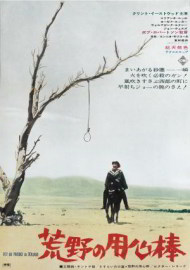 If there is a Kurosawa remake more watched than the original, Sergio Leone’s 1964 spaghetti western A Fistful of Dollars (“Per un pungo di dollari”) may well be it. And it’s our film club title for the month of August.
If there is a Kurosawa remake more watched than the original, Sergio Leone’s 1964 spaghetti western A Fistful of Dollars (“Per un pungo di dollari”) may well be it. And it’s our film club title for the month of August.
Sergio Leone infamously took Kurosawa’s Yojimbo and turned it into a western, launching his international career in the process. Kurosawa and Toho were never asked for the adaptation rights and were not happy, successfully suing Leone and receiving a cut from the money that the film made internationally. Kurosawa is in fact said to have made more money from A Fistful of Dollars than he ever did from Yojimbo.
Whatever you may think of the morality of Leone’s actions, A Fistful of Dollars is not a bad film. It is, in fact, a brilliant film, and stands well on its own next to Yojimbo, even if it is at times an almost shot-by-shot remake (while at other times deviating from the source). Clint Eastwood’s screen charisma as the “Man with No Name”, while different from Toshiro Mifune’s, is fascinating, and the story works very well when adapted into the western setting.
For a more in-depth comparison of the two films, as well as the later Last Man Standing, I suggest taking a look at the earlier thread Yojimbo: ‘A Fistful of Dollars’ and ‘Last Man Standing’. Our other previous discussion on the film can be found from behind the A Fistful of Dollars tag.
A recent interview with Clint Eastwood is also well worth watching.
A Fistful of Dollars is widely available on home video. Also consider the various box sets that collect Leone’s full “dollars trilogy”, which include also For a Few Dollars More (1965) and The Good, the Bad and the Ugly (1966).
In September, we move on to Kurosawa’s Sanjuro. For the full schedule, see the film club page.
So, where were you when you first saw A Fistful of Dollars? And did you see it before or after Yojimbo?






*waves* I regret my recent absence. I did take the time to rewatch Yojimbo and the commentary. I saw A Fistful of Dollars for the first time long after I’d first seen Yojimbo, although I don’t remember if I saw just before seeing Yojimbo for the second time or right after. I already knew that Dollars was an unauthorized remake of Yojimbo. Nevertheless, it’s the only remake of a Kurosawa movie that taken is the equal of the original, taken as a whole. It also has independent significance as being the launching pad for spaghetti Westerns. It might not be the first, but as I understand it, it was the first to hit it big in the US and internationally.